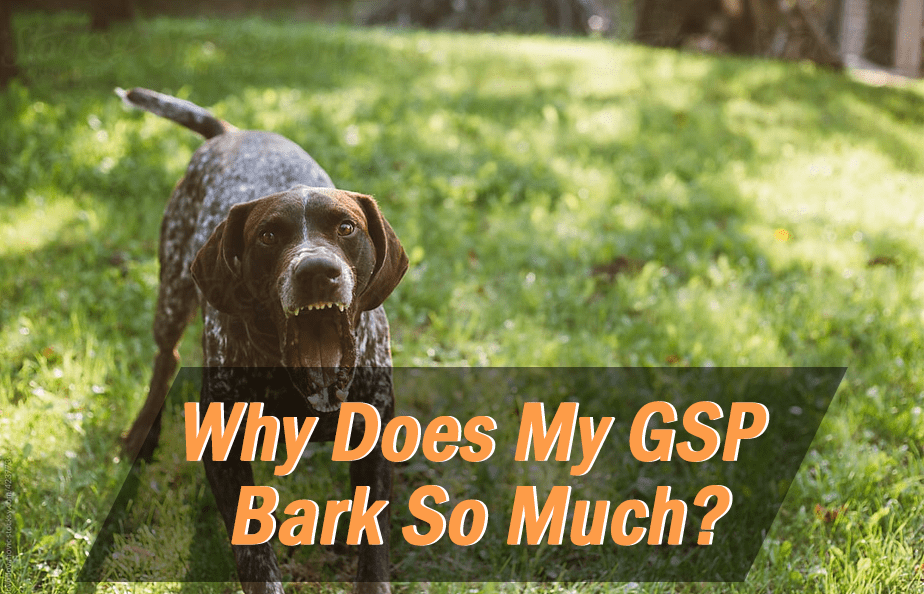Are you a concerned pet parent wondering why your adorable German Shorthaired Pointer is barking so much? Or you might be a new parent to a GSP.
Whichever it may be, today, we’re going to talk about the barking problems related to GSPs – be it a puppy or an adult one. So, if you’re interested to find out more, we suggest you stick around.
From understanding why GSPs bark to more barking related aspects, we’ll be covering several questions on the matter, including:
- How do I get my GSP to stop barking?
- Do pointer dogs bark a lot?
- How do I get my dog to stop barking at everything?
One primary reason for repetitive and disruptive barking from pointers is “boredom.” That’s right! Pointers being the energetic dogs they are, tend to bark when they’re bored & confined for a long time. This disruptive behavior shows up with other behaviors such as digging and destructive chewing.

How do I get my GSP to stop barking?
If you find yourself constantly trying to keep your GSP from barking, here are some methods that can assist in managing your anti-barking efforts.
Remember that the longer your GSP has been barking, the more time and effort it will take to change the behavior.
- Eliminate the Motivation: Try to figure out the sole reason/purpose that gets them barking and what they get from it. If you’re able to pinpoint them, you can start to remove them slowly, which can further help them differentiate good behavior from bad.
- Ignore the Barking: If you find your Pointer barking only for attention, try to ignore the behavior until they eventually stop. Once they finally go noiseless, use the ‘good behavior reward technique’ and treat them.
- Keep them Tired: Make sure your PointerPointer gets sufficient mental and physical activity daily. This way, it can benefit their high energy and health while also keeping the barking to a minimum as they will likely be tired.
- Call Up a Professional Trainer: If or when you’re finally convinced that your PointerPointer may be a compulsive barker and produces no good results even with the above methods, it’s time to bring in the pros. At this point, reaching out to a licensed professional trainer will be a good bet.
Remember that Pointers are not necessarily a noisy breed by nature, so, by barking, they may be trying to communicate something else.
Hence, it’s also important to give context to their barking as it may happen in a different environment, which we will discuss briefly, so keep reading on.
Do pointer dogs bark a lot?
As mentioned earlier, Pointers don’t bark excessively. In fact, they have a low barking tendency when trained and kept well physically. So, most barking normally results from boredom or alerting owners of some danger.
Hence, the energetic levels of Pointers must be directed towards a more constructive path, or it may bring out unpleasant behavior. Pointers also tend to bark upon hearing strange noises or noticing strangers around the house. This barking can also be triggered when they see other animals such as birds or squirrels.
Zero barking from dogs is a myth. Barking is how dogs communicate and express themselves, so you cannot expect zero barking from them. However, you can minimize the noise level if you find your PointerPointer barking excessively.
How do I get my dog to stop barking at everything?
Barking is part of a dog’s life, but excessive barking may give rise to multiple reasons. Here are a few factors and how pet parents can effectively subside the behavior:
Barking at Night
There are several reasons why your GSP may be barking at night, including boredom, fear, attention-seeking, loneliness or alertness, etc. While each of them can trigger your PointerPointer, the solution is simple.
One main remedy can be to have them inside if they sleep outside at night. This can help prevent many factors such as noise exposure that triggers barking or isolation.
If they happen to sleep inside yet bark at outside noise, you can try using white noise makers within the room to muffle the outside sounds. Another option is to exercise them before bedtime, and this can help exhaust them, leading to faster and better sleep.
Barking at other Dogs
Your PointerPointer may bark at other dogs/pets due to excitement, fear, playfulness, territorial threats, anger, under-socialization, etc.
One great way to prevent this is to deal with and gradually improve their socialization. Start by taking them around dog parks and safe environments and introducing them to other dogs around the vicinity.
You can also reward this behavior by offering treats to indicate socialization as a good thing. That way, they will be able to learn that socializing is good behavior and practice more in the future.
Barking at Strangers
People tend to wonder if Pointers can be good watchdogs. But this can be a bit tricky due to its attentive yet non-aggressive nature. Pointers are not aggressive breeds, and that’s that.
However, their hunting ancestry brings out a good sense of alertness. They can instantly bark to relay the message that something might be wrong or when strangers hang around the house or are at the door.
Safe to say, barking is pretty much all Pointers will do. So, they usually make good watchdogs rather than guard dogs, which can be a plus point of their barking if you look at it from a security standpoint.
What does it mean when your dog constantly barks?
Pointers or not, dogs always bark for a reason, even if it doesn’t appear to be so. If there’s excessive barking, it’s time to understand why and what causes that.
Here are some common causes behind excessive barking:
Excitement
If your GSP buddy is barking a little too much when it gets excited over something, they should be taught that such barking behavior won’t get them anywhere.
Some dogs tend to get too excited and bark excessively when seeing/meeting other dogs. Hence, it’s crucial to socialize with others to help them remain calm.
Disturbances
Dogs are territorial animals by nature. So, barking is a means to warn and alert their pack of any disturbances. While this is considered normal, this “territorial” influence can often lead to excessive barking at other animals and people.
Anxiety
Dogs are also prone to barking at times of anxiety. When dogs are left alone, they can often suffer separation anxiety.
If such may be the case, your dog may bark a lot and adopt destructive behaviors like chewing items or scratching doors. You may also find them pacing back & forth and panting.
Attention
Knowing how German Shorthaired Pointers are sensitive to high energy levels, they require great care and attention for their caregiver. They need an active life; thus, they may start barking excessively just for the sake of attention.
Hence, you may want to spend more time with your buddy to match their needs.
Are GSPs Communicative?
German Shorthaired Pointers were historically bred to be hunter companions, meaning they carry excellent communication skills.
GSPs in their field mode can pinpoint where other prey animals are and can understand the unspoken request of hunters to pin them out more precisely and thoroughly.
Pointers will often express this desire in a home setting by pointing out any potentially dangerous prey items that may not interest you much. This is how GSPs whine/bark to communicate their findings around the house, such as seeing a bird or another dog outside.
Are GSPs easy to train?
Yes, but it’s not that simple. As a GSP parent, you have to know what to do. German Shorthaired Pointers are always eager to please their humans so that they will work towards positive reinforcements. They’re also not as hard-headed or stubborn, which means they can pick up exercises and tricks pretty quickly.
They also carry high intelligence, which sometimes creates the challenge of keeping them focused rather than having them invent new variations of the tricks & exercises.
Now, GSPs are very sensitive, so trainers and parents should be watchful of reactions and body language to certain issues during training.
For additional assistance, make sure to follow the general rule of rewarding for desired behavior and ignoring or using simple verbal correction against any undesired behavior.
Final Thoughts
As most dogs do, Pointers will also bark repeatedly during playtime. So, if you’re trying some chasing game with your GSP, you have not much to worry about as they may bark from excitement.
We hope this article on GSP barking has been helpful if there are other issues (similar to what we mentioned above).
Remember that puppy training helps shape a dog’s behavior, including barking. So, if you’re a new parent to a German shorthaired pointer, regular exercise and training are one way to go.

